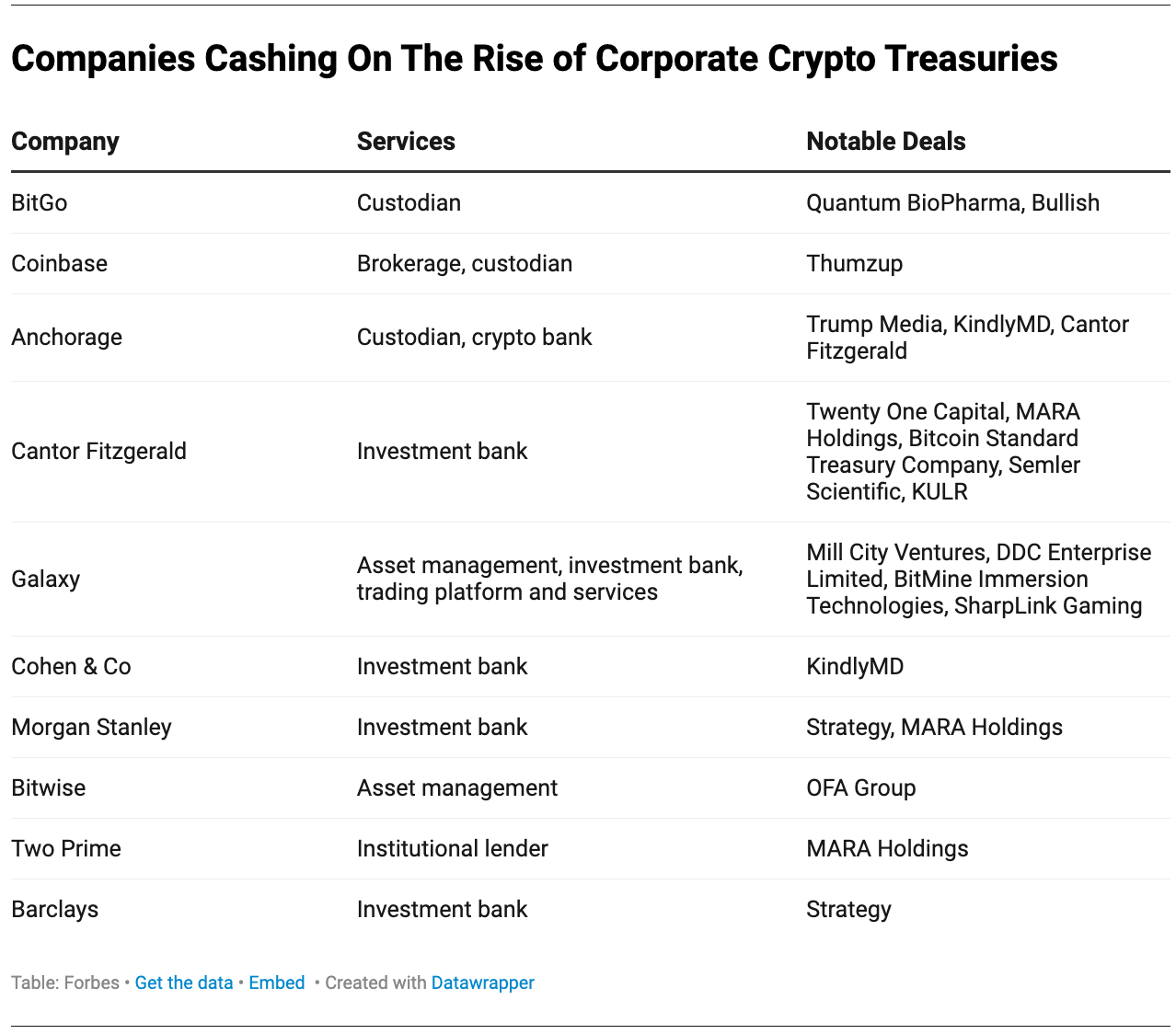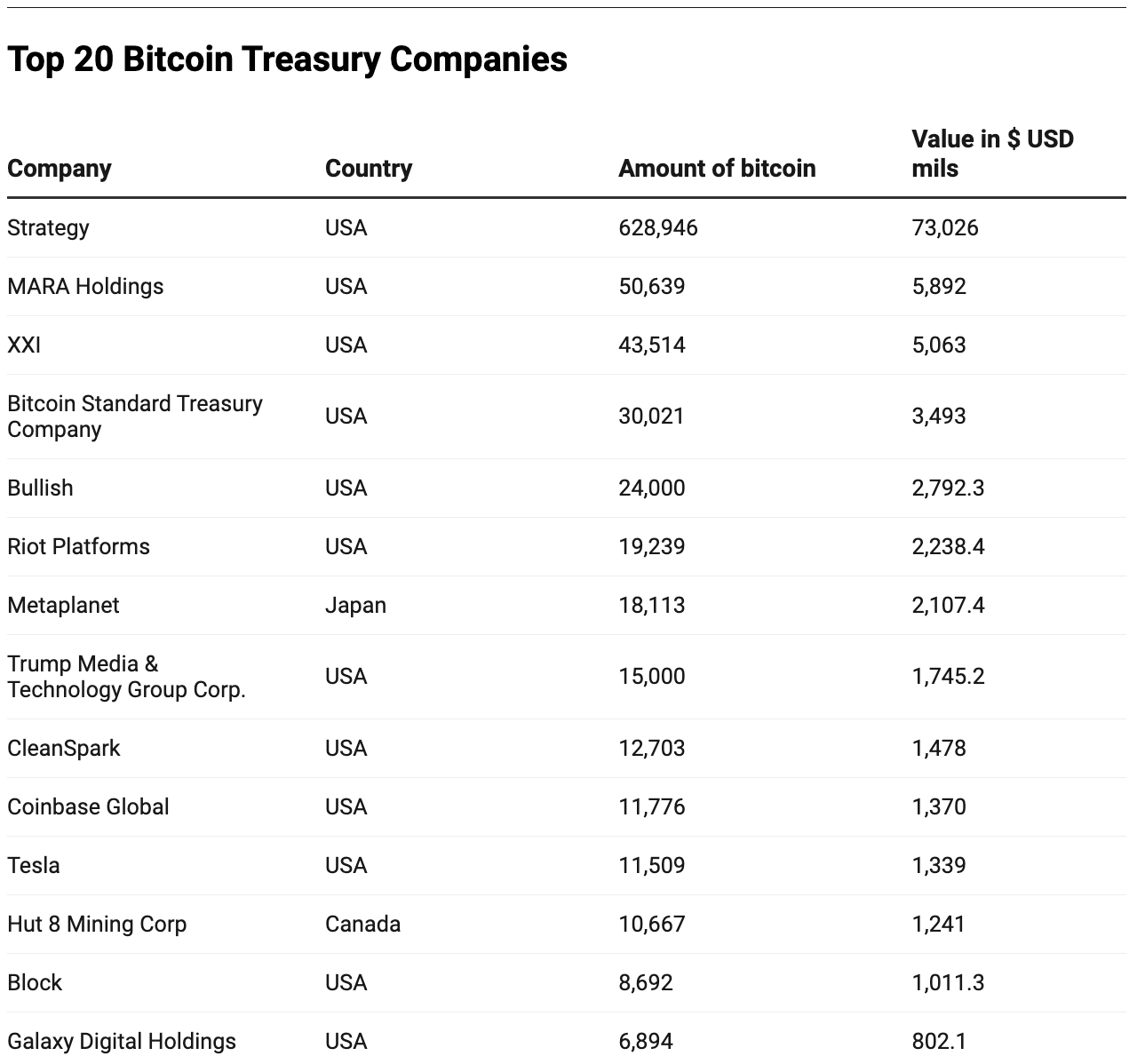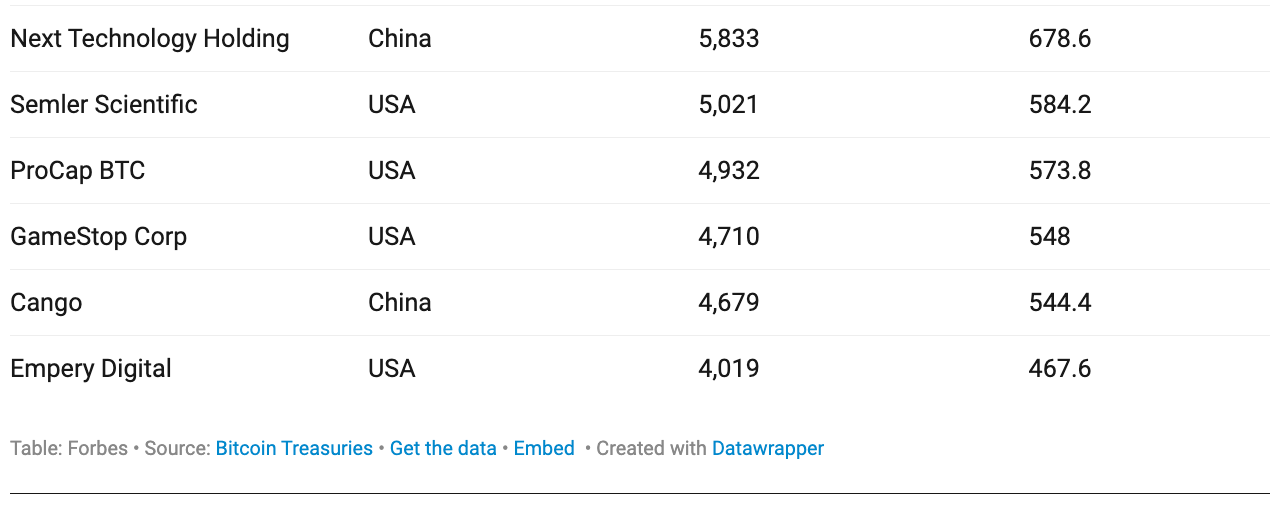Author: By Julie Goldenberg
Source: Forbes
Translation: Liam
A record number of publicly traded companies are incorporating cryptocurrency into their balance sheets—ostensibly to diversify holdings, hedge against inflation, and attract new investors. Of course, the unspoken reason is that management hopes to boost stock prices. In recent months, merely announcing a so-called "cryptocurrency fund management" strategy has been enough to increase trading price premiums.
However, the real wealth is flowing to the merchants in this latest gold rush: custodians, brokers, asset management firms, and investment banks that earn service fees on every transaction, transfer, and storage deal.
Nathan McCauley, co-founder and CEO of San Francisco's Anchorage Digital, stated that this trend has reached "frenzy levels" and is "highly contagious" over the past six months. His cryptocurrency bank has secured agreements to manage Trump Media's $2 billion Bitcoin reserve, as well as the $760 million assets of Bitcoin-focused Nakamoto Holdings. Nakamoto Holdings recently announced a merger with KindlyMD through a special purpose acquisition company (SPAC). KindlyMD is a Salt Lake City healthcare company with minimal losses, whose stock price had lingered below $2 per share before the May press release. Today, KindlyMD's Nakamoto is listed on Nasdaq under the NAKA ticker. The name Nakamoto pays homage to Bitcoin's anonymous founder, Satoshi Nakamoto. The company's stock price is $15, with a market capitalization of $114 million.
A year ago, a small group of corporate buyers held just over 416,000 Bitcoins in total. Now, according to data from Bitcoin Treasuries.net, at least 152 publicly traded companies control over 950,000 Bitcoins, worth more than $110 billion. Among them, the undisputed giant remains billionaire Michael Saylor's Strategy Inc., which pioneered corporate cryptocurrency investment strategies heavily reliant on innovative financing methods ranging from convertible bonds to floating-rate perpetual preferred stock. Strategy Inc. was originally a small software company based in Tysons Corner, Virginia, named MicroStrategy, and currently holds Bitcoin worth $73 billion, with a market cap of $95 billion, 25% higher than its cryptocurrency asset holdings.
The imitators of Strategy have not stopped at Bitcoin—they are also purchasing Ethereum, Solana, and a range of other digital assets. According to Palo Alto-based cryptocurrency consulting firm Architect Partners, corporations have raised over $98 billion for such investments this year alone, with 139 companies committing to invest $59 billion since June. A recent example is World Liberty Financial, a cryptocurrency company controlled by the Trump family, which recently announced the launch of a $1.5 billion "crypto treasury," backed by its own token WLFI. Additionally, Trump Media holds a $2 billion Bitcoin "crypto treasury."

Elliot Chun of Architect Partners stated that since this trend is still in its early stages, its broader impact is difficult to quantify, but this craze has already "generated a lot of fees across various sectors."
The underwriting commissions and other fees from preferred stock and convertible bond issuances have proven to be a lucrative business for many traditional investment banks and brokerage firms, including Morgan Stanley, Barclays Capital, Moelis & Company, and Canaccord Genuity.
For example, Strategy's recent issuance of 8.5 million preferred shares in March raised $722 million. Morgan Stanley acted as the underwriter, with a dozen other firms collecting about $10 million in fees. MARA Holdings, a Fort Lauderdale-based company focused on cryptocurrency mining, is currently buying and hoarding Bitcoin and issued $950 million in convertible bonds in July. Morgan Stanley and other firms likely earned $10 million from this deal.
Another beneficiary of the cryptocurrency fund management boom is qualified custodians, who hold digital assets on behalf of clients. For instance, BitGo, a long-established company based in Palo Alto, has seen its custodial assets exceed $100 billion in the first half of 2025, thanks to the booming cryptocurrency market and the growth of corporate fund management.
Adam Sporn, head of institutional sales and prime brokerage at BitGo, stated, "The share of (corporate fund management) in our business is continuously growing. Six months ago, we didn't see much business focused on this, but now this new client segment makes up a significant portion." He estimates that in the past few months alone, about twenty cryptocurrency fund management firms have announced custodial agreements with BitGo. The surge in business has paved the way for the company to secretly file for an IPO in July.


Major custodians like BitGo and Coinbase charge institutional clients upfront fees, annual fees, and additional charges for holding cryptocurrencies and helping them earn yields. Ravi Doshi, co-head of global markets at FalconX, noted that the most common structure is an annual fee based on custodial assets, typically ranging from 0.15% to 0.30%, but large clients can negotiate rates down to 10 basis points, or 0.10%.
While these fees can mean hundreds of millions in revenue for custodians managing tens of billions in Bitcoin, the profits from custodial transactions are often slim. The demand for cryptocurrencies generated by these agents also creates additional revenue for exchanges and major brokers like Coinbase, FalconX, and Cumberland. Mizuho senior fintech analyst Dan Dolev pointed out that each purchase creates a cycle: more purchases drive up prices, attract new investors, and bring more tokens to trade.
In addition to trading and custody, yield services such as staking, lending, and options coverage are also another lucrative area. Staking rewards users who lock up tokens to help validate blockchain transactions, while options strategies involve using financial derivatives to adjust the risk-return profile of a portfolio without changing its underlying asset allocation.
"When these companies raise funds and intend to incorporate them into their balance sheets, they quickly face the question of 'what now?'" said Chun of Architect Partners. "There are over $60 billion in crypto assets that need to generate returns, and these public companies cannot do it alone." Sidney Powell, CEO of Melbourne-based crypto lending company Maple Finance, stated that so far, companies have relied on the appreciation of underlying assets to drive returns, but the rapid spread of the cryptocurrency fund management trend will force companies to seek yield-generating strategies or low-cost capital to purchase Bitcoin, thereby achieving differentiation.
Juan Leon, senior investment strategist at cryptocurrency asset management and consulting firm Bitwise, indicated that to build a competitive edge, these companies may increasingly turn to lenders like Two Prime and Maple Finance, as well as asset management firms like Wave Digital Assets, Arca, and Galaxy, which charge between 25 to 50 basis points for their fund management services. Earlier this month, Galaxy reported that its asset management business received $175 million in inflows, part of which was used to provide asset solutions for about 20 clients holding cryptocurrencies.
Meanwhile, Wall Street has begun to fund this cryptocurrency boom. Under President Trump's leadership, the policy environment has become more favorable, and regulations clearer, with institutions like mutual fund giant Capital Group, hedge fund D1 Capital Partners, and investment bank Cantor Fitzgerald providing funding for companies hoarding cryptocurrencies.
Despite the presence of detractors in the cryptocurrency space, the boom in digital asset financial management is still in its early stages. "We believe that ultimately all companies will become cryptocurrency financial management companies in some way," Leon stated, noting that global corporate cash reserves are currently about $31 trillion. "Whether 1%, 10%, or 100% of their balance sheet assets are cryptocurrencies, they will hold some assets. Therefore, we have significant room for growth."
免责声明:本文章仅代表作者个人观点,不代表本平台的立场和观点。本文章仅供信息分享,不构成对任何人的任何投资建议。用户与作者之间的任何争议,与本平台无关。如网页中刊载的文章或图片涉及侵权,请提供相关的权利证明和身份证明发送邮件到support@aicoin.com,本平台相关工作人员将会进行核查。


